TBSHS Students Speak in Oxbridge Events
Cambridge & Oxford Schools Debating Competitions
Cambridge University Schools Competition
Three pairs of TBSHS debaters travelled to the Cambridge Union to take on 53 other teams. All our teams enjoyed considerable success speaking first in favour of banning religious or social organisations from running independent schools, Oliver Worthy (Year 13) set out clear definitions of the key words in the motion and identified school students as the most important stakeholders in the debate. He argued that since independent schools have greater freedom to design their own curriculum, those run by religious organisations are likely to place undue emphasis on what they see as “the right religion”, depriving students of a well-rounded education. He was well backed up by India Purton (Year 12), who countered the Opposition assertion that the motion infringed freedom of parental choice by pointing out that students may not agree with their parents’ religious views or those of their school. The judge awarded the TBSHS team first place because they engaged well with their opponents and justified their points rather more convincingly. Year 11 students Barnaby Nicholson & Elliot Lavergne were placed second, as were Henry Aylett (Year 12) & Aidan Quinn (Year 13) in their room.
The next debate saw these two teams on opposite sides of the motion “This House, as a parent, would actively instil in children the value of disobeying authority”. Opening against the motion, Aidan began by attacking the opening speaker’s attempt to equate questioning authority with disobedience and went on to argue that the latter was not a value that should be forced on children. Henry also provided some very effective rebuttal to the notion that being a disobedient dropout had led to many successful entrepreneurial careers. The judge placed this team first, partly because they had done more to consider the motion from the parent’s viewpoint than any of the other teams had. 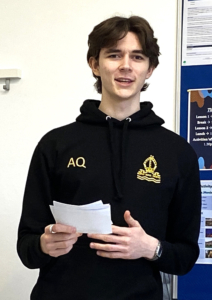
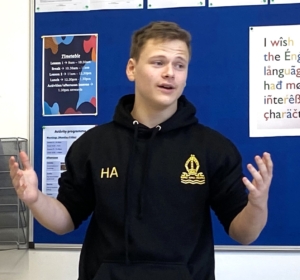
Elliot & Barnaby, in the very difficult position of closing for the motion, engaged well with the Opposition but were unable to contribute much new material and had to settle for fourth place. Meanwhile India & Oliver picked up a very close second place.
After lunch, our two Sixth Form teams found themselves on opposite sides in the ‘bottom half’ of a debate about environmental policy being decided by Aidan & Henry
unelected scientific experts chosen by their peers. For the motion, Aidan argued that the motion offered an effective and efficient solution to a problem that affects the whole world and it would encourage voter turnout. India countered this by saying that not being able to affect policies by electing those make them would deter voters and suggesting that MPs are more able to ‘see the bigger picture’ of government spending priorities.
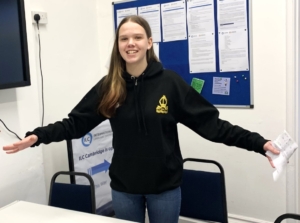
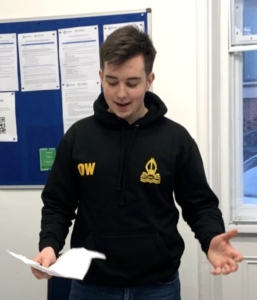
Summarising for the motion Henry stated that he trusts scientists more than politicians, especially in their specialist fields and tackling the climate crisis matters more than the other issues raised. Finally, Oliver identified India’s arguments as the main reason that his side had won the debate, adding that scientists do not always have the interests of the general public at heart. In another close decision, he and India came second, with Henry & Aidan third. In their room, Barnaby & Elliot gained a second place India & Oliver
The final motion of the day “This House Would introduce a universal basic income” saw all our teams on the Opposition side. Aidan & Henry, closing their debate, argued against the extension of the ‘nanny state’ and the unbalanced economy that the motion would bring about. They were awarded fourth place, when I felt that they deserved much better. In contrast, Elliot & Barnaby beat three independent Cambridge schools to record a win in their room.
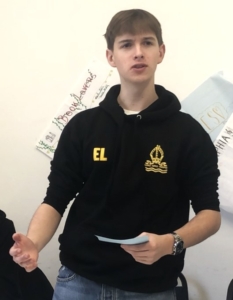
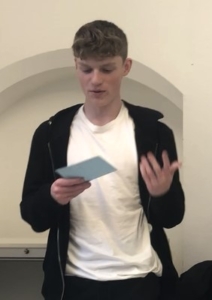
Meanwhile Oliver & India found themselves up against the three teams at the top of the standings after three rounds. However, they rose to the challenge magnificently, gaining a second place that propelled them to fifth place in the overall table and a place at International Finals Day. Barnaby & Elliot gained a very creditable 15th place, with Henry & Aidan 25th.
Elliot & Barnaby
Retired teacher Tony Fraser commented, “This was a very pleasing day’s debating. TBSHS was one of only two schools with three pairs in the top half of the team standings. Congratulations to India, in her first interschool event, and Oliver for progressing to the final stage of the competition. They came equal sixth out of 112 on individual speaker scores, with our other four representatives all in the top 40”.
Oxford University Schools Competition
Just over a week later, we entered four teams for the online regional round of the corresponding Oxford competition. This was an evening event, held after school over just two rounds of debating, with over 50 teams competing for places at Finals’ Day. The first motion, “As a secondary school student, this house would use generative AI to assist them with the completion of school work”. Year 13 students Mya King (making her interschool debut) & Aidan Quinn opened the case against the motion with two well-constructed speeches in which they criticised the short-sightedness of using AI rather than developing the skills needed for success in exams and employment.
Aiden & Mya Robert & James
The Year 11 team of James Frans & Robert Gor, opening the debate in their room, more than held their own against older students from Shrewsbury School and Wymondham College. In the second debate Isobel Sanders (Year 12), who only began debating in October, spoke first in favour of implementing a policy of positive discrimination for men in female-dominated occupations such as nursing and teaching.
She argued that this could be achieved by providing bursaries for men to study for such professions and that the subsequent increase in male professionals in these areas would reduce bias and gender stereotyping. She was well backed up by Adrian Atanassov (also Year 12), who pointed out that male primary school teachers provide important role models for boys and some male patients might feel more comfortable being treated by male nurses.
Isobel & Adrian Alex & Luca
Experienced Year 13 debaters Luca Ollandini & Alex Banhidai had to close the case against the motion, which they did very well. Luca argued that the quality of a teacher or nurse is more important than their gender, warning of tokenism, and Alex rounded off a winning performance with a rousing summary speech explaining why his side’s arguments, especially Luca’s points, outweighed those of his opponents. Unfortunately, none of our teams qualified for Finals’ Day, with Alex & Luca just missing out because the judge felt that they had not engaged sufficiently with the ‘actor’ element of the first motion. Nevertheless, all four teams acquitted themselves very well and deserve thanks for giving up their time.
In all, no fewer than 24 different students have debated for TBSHS in the space of less than four weeks, a measure of the strength in depth that we now have in the school.



